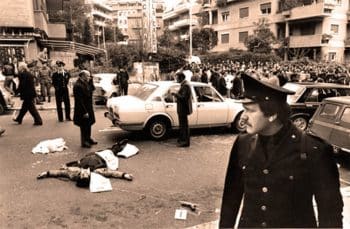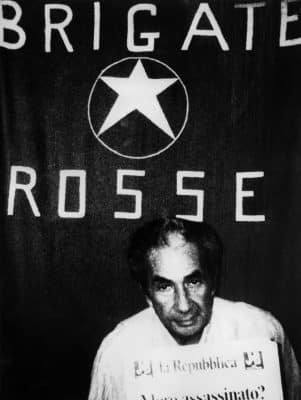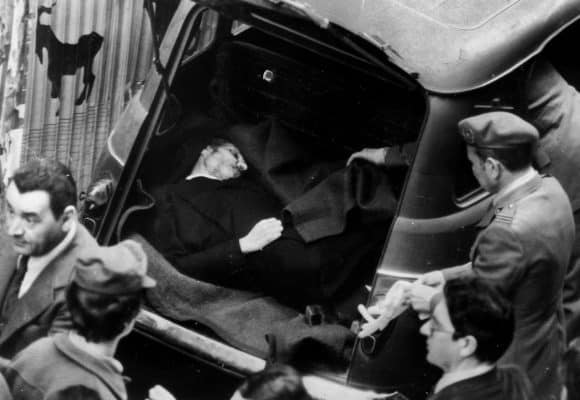Premise: Reporting on the still unresolved abduction and murder of statesman, Aldo Moro, by the Red Brigades in 1978—or at least in their name—the current Rome occasionally left-wing investigative magazine, Espresso, reports that not only the USA but also many European leaders considered Premier Moro’s project to bring the Italian Communist Party (PCI) into the Rome government destabilizing and of the utmost danger to European security. Thus, on both sides of the Atlantic, the Premier himself was considered an obstacle to be removed at all costs.

Today, four decades since Moro’s murder the US government has declassified or opened to the public a mere 372 cables between the US Embassy in Rome and the State Department in Washington on the subject, a small number for a case of such relevance. Moreover of those 372 cables only 35 files were even classified in the first place. Washington most have thousands of still secret communications between the State Department and the US Rome Embassy concerning Aldo Moro.

Nonetheless the 35 files recently divulged by Wikileaks and Espresso reveal the sordid nature of international relations of that historically recent past and permit the reconstruction of the US fear in those years of the entrance into the Rome government of the Communists of the PCI led then by Enrico Berlinguer.

Espresso Magazinecites a cable of January 1978 which describes a Christian Democratic leadership moving “slowly but inexorably in the direction of more and more concessions” to the force of a Communist party with behind it one-third of the Italian electorate and the then powerful and huge left-wing trade unions.. Moro’s so-called “historic compromise” of the Christian Democrat government with the dreaded Communists infected not only the air of the Italian peninsula but also lands far beyond the Alps and Italy’s seas.
Governments of France and Spain—with their own strong Communist parties to deal with—were uneasy in the knowledge that they were not immune to contagion from a Communist-leaning Italy. In the fateful 1978 the government in Paris confessed its extreme concern: “If the PCI enters the government in Rome before French elections in March, there would be a deep echo in France.” According to Espresso the US Ambassador in Paris wrote to the State Department that the Secretary General at the Elysée Palace blamed the Italian Christian Democratic Premier Aldo Moro “who is convinced there is no other political solution today without the PCI.” Likewise the German Chancellor Helmut Schmidt was critical of Moro and his agreements with the Communists.
When then American diplomats (and CIA which at the time claimed it “ran things in Italy”) spoke with the insiders of Italian politics such as the prominent journalist Indro Montanelli about the concern in US and European capitals they concluded that that the situation in Rome was calamitous and would spread like flood waters across Europe.
Montanelli, the PCI and Pinochet
The Rightwing Italian Journalist, Indro Montanelli, beloved by Liberals, preferred the Fascist General Pinochet at the helm of the Rome government rather than Communists. In a cable with the title “Montanelli sees blood in arrival” US diplomats reported to Washington the “tactics” proposed by Italy’s beloved but ambiguous right-wing journalist: blackmail the Christian Democratic Party (DC) which is about to make concessions to the Communists; force Berlinguer to return to hardline policies which will surely ignite a civil conflict in which the PCI would be destroyed. Black mail? The DC could easily be terrified by threats to reveal to the public the US funding for the party since WWII, while the idea that the PCI could return to its revolutionary roots was real to most people.

Blood would flow in the streets of the Bel Paese. It would be a difficult time for all. But, Montanelli concluded, the PCI would be defeated. Such was Montanelli’s fervent dream. The mystery however, even according to Montanelli, is what would then happen within a victorious Christian Democracy. Perhaps Italy would create a “democracy (sic) like that of General Pinochet in Chile. “A hellish prospect,” US diplomats reported in January of dramatic 1978 … but better than a government alliance with the Communists.

Also according to the beloved journalist Indro Montanelli who described himself as an “anti-communist, anarcho-conservative”. During the Fascist era he actively supported Italian colonialism in East Africa and Libya: thus he was a Fascist. He acquired the designation of “post-Fascist or neo-Fascist” in the post-war when official Fascism was outlawed. As a journalist he tried to disengage himself from public affairs and declared himself and his newspaper, Il Giornale, supporters of the “little man”, something like the class on which President Donald Trump finds his base today and to which he speaks. Montanelli obscured the difference between Fascism and anti-Fascism (the antifa of today) and between right and left as per the “nouveaux philosophes” like Bernard Henri-Levi. Thus he shared with them the creation of a gray zone between the leading ideologies of his century.
According to Italy’s famous journalist-writer-historian, Indro Montanelli, “an authoritarian government of the right would be more desirable than a government with communists.” (The late US national security adviser Jeanne Kirkpatrick fiercely defended this precise ideology under the amiable crypto-fascist Ronald Reagan. Teflon and largely clueless but solidly reactionary Ronnie did not mind, he made her US ambassador to the UN, too.—Ed.)
Such is part of the political atmosphere in Italy in 1978. At that point the die was cast.
Yet, on March 16, 1978, the day Moro was abducted by the Red Brigades, not one single secret cable describing in detail the abduction of the Italian statesman and massacre of his bodyguards is available. The question is where are those cables today that must have left the US Embassy on Rome’s Via Veneto on that March day? The Ides of March! The missing cables that COULD explain the great Italian triangular mysteries reigning in America’s complex vassal state: the true identity of the still beloved Red Brigades of 1978, the unruly American-linked (read financed and guided by Washington) DC-led government, and the future of Europe’s biggest Communist Party, the PCI.
The ensuing bizarre situation related to these three “parties”: the “armed party” of the Red Brigades and those great powers they represented; the US-supported Christian Democracy: and the Italian Communist party with one-third of the national electorate behind it. I have placed the Red Brigades (BR) in the first position since they appeared as the principal actors-instruments in the Moro tragedy and the tragicomedy of Italian politics.
The original Brigadists had been infiltrated, arrested and safely tucked away in Italian penitentiaries. One of its two original founders, Alberto Franceschini told me in my Rome apartment that the Italian secret services could easily have “arrested us all years earlier but we were convenient and left in place”… as Daesh is today, I would add. What remained of the BR after the arrest of the original Brigadists was under strict US control since Italy was and has remained Washington’s vassal. The leadership of the new Brigades had become instruments of CIA and Italian secret services.
False flag impeccably (and cynically) planned and executed
Behind the scenes, the “terrorism” by right and left organizations raging in Italy and Germany was orchestrated by the NATO-organized Gladio secret army and the P2 secret masonic lodge headed by the self-vaunted Fascist Licio Gelli on which, like the Bilderbergers, top Italian leaders of all shades were members. Therefore it is no longer a surprise that in early 1978 the CIA, Italian secret services and their Red Brigade tool pulled off the abduction of the decade. After a farcical months-long manhunt while official Italy hypocritically debated whether or not to negotiate Moro’s release with the BR and political Italy was divided between the two factions, his body was found stuffed into the trunk of a car left, ironically, a few steps from Communist Party headquarters near Piazza Venezia, the center of Rome. The CIA had so decreed.
The Christian Democrats had been in power since 1946, put there at an enormous, incalculable cost to the American taxpayer. After over 30 years their rule continued, longer than the official Fascism of Mussolini. Falling governments, newly constituted government coalitions and Prime Ministers lasted an average of eight months. Giulio Andreotti was Prime Minister seven times and spent sixty years in Parliament during which time he was accused and subsequently acquitted of cooperation with the Sicilian mafia and became famous for his quips, the most famous of which was: was: “Power wears out those who don’t have it.”
No less than their US financiers, the main body of the DC could never even consider Communists in their government. Moro had to go: no negotiations with terrorists was the hypocritical decision. In reality, the decision arrived from higher levels. That is, from Washington. But since the BR had been disowned by the Communist Party, whose terrorists were then the Red Brigades? Of course the BR by then belonged anima e cuore, heart and soul, to Italian secret services and to CIA. That is not even in question. But that is the main point. Because of the Cold War it was also easy for Christian Democrat-CIA power in Germany to write off the Red Army Faction (RAF) in Germany—which was shattered in the same late 1970s—allegedly an instrument of the East German Stasi, the State Security Agency. That is another story … though in my estimation untrue.
Why is this history of four decades ago important? It is important because a nation’s history reaches into and affects the present. Though on the one hand the world in 1978 seemed to have never had it so good, on the other hand Saigon had fallen (or rather, been finally liberated) to the Vietnamese in 1975, in effect confirming the defeat of the USA in Southeast Asia. The Cold war raged and fear of Soviet victory in Europe was much alive. The specter of Communists at the helm in Italy—and who knows, a domino effect in Germany, France and Spain, haunted the US State Department. Communism lived and thrived however and contradictory as it sounds much to the delight of Western propagandists. The existence of Communism justified the innumerable institutions of anti-Communism, enormous “defense” budgets and military occupation of West Europe. The media and part of academia had the same field day with anti-Communism as they do with Islamic terrorism today. Global warming though it existed, played no role. Democracy? Maybe it cannot not be saved. Maybe it does not even exist. No matter. “Our freedoms” come first. Fear of Communism spread while the Berlin Wall stood there like a familiar, almost comfortable reminder of the great Satan to the East, the “evil Empire”. Power on both sides of the so-called Iron Curtain loved the Berlin Wall built by those evil Communists behind it.

The stability of that world was shaky. The West was engaged in more serious matters than democracy: capitalism instead searched desperately for new markets for its very survival. America’s expansion however was hampered by the nuclear-armed evil empire behind its wall. The USA ousted from Southeast Asia, the British Empire out of India, the French out of North Africa. The whole globe whirled. Where it would stop nobody knew. Neither the US government, nor the CIA, nor European Communists even imagined a traitorous Gorbachev coming to power in Russia. No one suspected that the dissolution of the USSR was just around the corner. No one would seem more surprised (and I believe disappointed) than the CIA.
Meanwhile in Italy the Moro case did not die. In the post-Moro period the Italian government was reduced to asking Americans for information about the Red Brigades, another sign that the terrorist group (that I find difficult to refer to as Red Brigades) had become, I believe, a CIA asset and an American appendage. Strange persona populated the Italian political stage. The silence of the US and Italian governments about their Red Brigades created widespread speculation in Italian political circles. For example the US Ambassador in Rome, Richard Gardner, answered official Italian requests for information about the Red Brigades that the “US government has not furnished any substantial information about the Red Brigades because we have no information: we do not gather information about terrorists here … nor do we have the capacity to do so.” That, in Rome, with one of the biggest CIA stations in Europe! There were no objections or follow-ups from the Italian side.
The just released cables depict the post-Moro period as one of a general reorganization and modernization of Italian secret services coupled with intensified and solidified links with American services and in many cases integration into similar US agencies. Personal contacts confirm that integration of Italian Intelligence organs into American agencies, especially on the military level, continues today, a conversion and an historic metamorphosis of secret national Intelligence services geared to protect and defend Italy’s national interests.
Moro died. The conspiracy against his recognition of the Communist Party changed the political complexion of Italy. We can only speculate about what the effects of Communists in the Rome government in that period might have been. In any case the then beloved PCI would have died a decade later, but the successors to a PCI coalition leadership could have developed differently. And Italy might have emerged from Montanelli’s gray zone more intelligently and thus more leftist than the gray colored governments of today.
GAITHER STEWART Senior Editor, European Correspondent } Gaither Stewart serves as The Greanville Post European correspondent, Special Editor for Eastern European developments, and general literary and cultural affairs correspondent. A retired journalist, his latest book is the essay asnthology BABYLON FALLING (Punto Press, 2017). He’s also the author of several other books, including the celebrated Europe Trilogy (The Trojan Spy, Lily Pad Roll and Time of Exile), all of which have also been published by Punto Press. These are thrillers that have been compared to the best of John le Carré, focusing on the work of Western intelligence services, the stealthy strategy of tension, and the gradual encirclement of Russia, a topic of compelling relevance in our time. He makes his home in Rome, with wife Milena. Gaither can be contacted at [email protected]. His latest assignment is as Counseling Editor with the Russia Desk. His articles on TGP can be found here.
Originally published in The Greanville Post










































